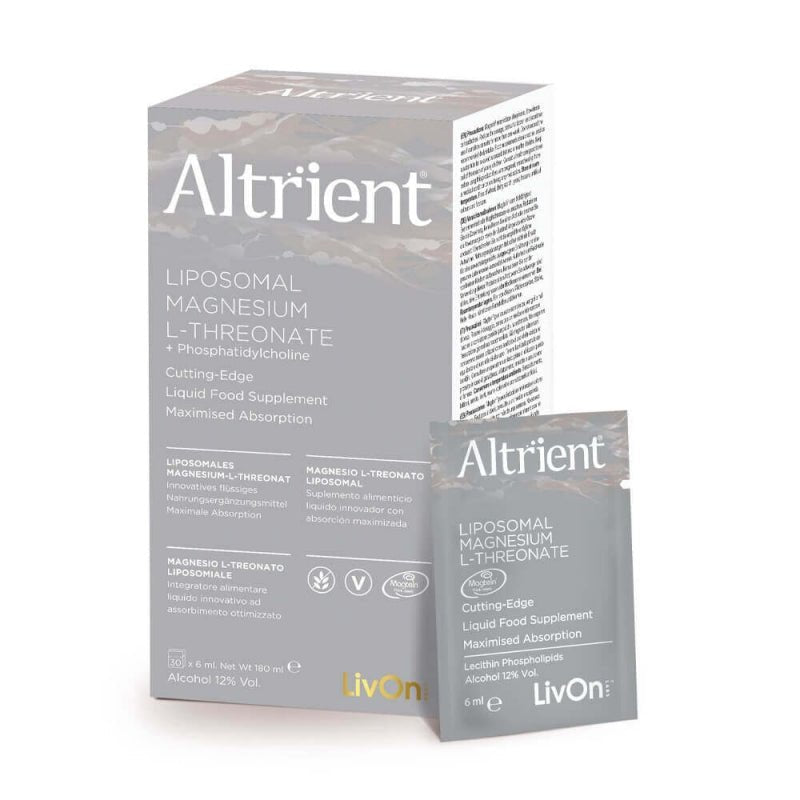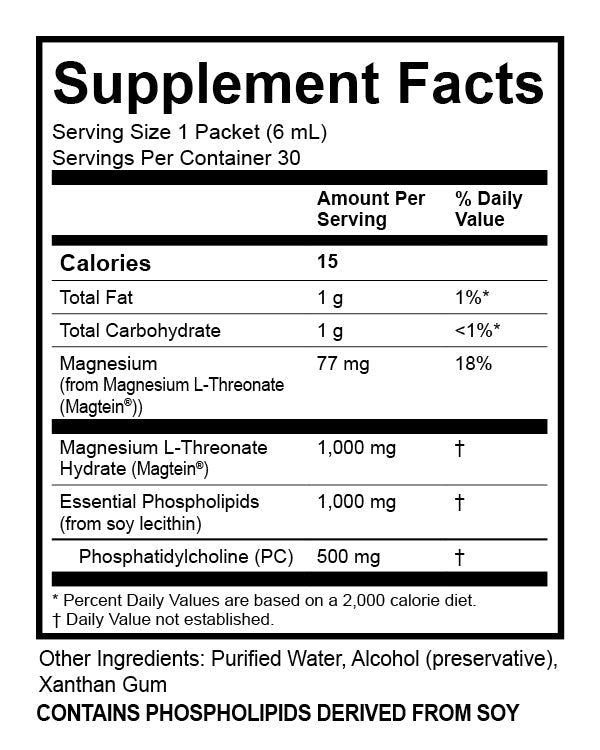Altrient liposomal magnesium L-threonate
Altrient liposomal magnesium L-threonate Black is backordered and will ship as soon as it is back in stock.
Altrient Liposomal Magnesium L-Threonate – Improved brain function and overall health
Altrient Liposomal Magnesium L-Threonate is a unique magnesium supplement developed to support brain health, reduce fatigue and contribute to healthy magnesium values in the body. This supplement combines magnesium bound to threonate – a compound known for its ability to cross the blood-brain barrier – with advanced liposomal technology for the best possible absorption and effectiveness.
Summary
Containing Magtein®, a patented form of magnesium L-threonate, Altrient Magnesium provides superior bioavailability and is the only magnesium supplement that demonstrably increases magnesium levels in the brain. This makes it ideal for those who want to strengthen cognitive functions, promote memory and maintain mental acuity through ageing.
Benefits of Altrient Magnesium L-Threonate
- Improves cognitive abilities: Supports memory, attention and learning ability, which has been documented in clinical studies on people over 50 years of age.
- Reduces fatigue: Magnesium helps to reduce fatigue and exhaustion.
- Supports brain function: Increases magnesium levels in the brain, which in turn improves neuroplasticity and synapse formation, essential for learning and memory.
- Promotes bone health: Magnesium and calcium work together to strengthen bone structure.
- Easy on digestion: The liposomal formulation ensures high absorption without side effects such as loose stomach, which often occur with other magnesium supplements.
Technical information and ingredients
Each package contains:
- 1000 mg magnesium L-threonate
- 1000 mg of essential phospholipids
Ingredients:
- Purified water, lecithin-phospholipids (soy), magnesium L-threonate, ethanol (12%), xanthan gum (thickener).
Packaging:
- 30 individual packages per carton.
Recommended dosage
Take two packets daily in divided doses – one in the morning and one two hours before bedtime – or as recommended by a healthcare professional. For best results, squeeze the contents into a cold drink and consume in its entirety. The product does not dissolve in water.
Health claims for magnesium (approved by EFSA)
- Contributes to normal energy turnover.
- Supports the normal functioning of the nervous system.
- Contributes to normal psychological function.
- Promotes normal muscle function and protein synthesis.
- Contributes to maintaining normal bones and teeth.
- Reduces fatigue and exhaustion.
- Plays a role in the cell division process.
Liposomal technology for better absorption
By using liposomal encapsulation technology (LET), Altrient Magnesium ensures that nutrients remain intact throughout the digestive process and reach the cells where they are needed most. This technology protects the active ingredients, which provides the best possible absorption and effectiveness.
Reservations and security
Allowed to be used by adults over 18 years of age. The recommended daily dose should not be exceeded. Pregnant, breastfeeding and people with medical conditions should consult a doctor before use. Dietary supplements should not replace a varied diet. Keep out of the reach of children. Uno Vita AS does not claim that the products we market can cure disease.
References
- Slutsky, I., et al. (2010). Enhancement of learning and memory by elevating brain magnesium. Neuron, 65(2), 165-177.
- Liu, G., Weinger, J.G., Lu, Z.L., & Xue, F. (2013). Cognitive enhancement with magnesium-L-threonate in aging and Alzheimer's disease. Journal of Alzheimer's Disease, 35(3), 591-605.
- Barbagallo, M., & Dominguez, L.J. (2010). Magnesium and ageing. Current Pharmaceutical Design, 16(7), 832-839.
- Leahey, T. M., & Egan, B. M. (2014). Magnesium supplementation improves mood in the elderly. Journal of Nutrition in Gerontology and Geriatrics, 33(2), 123-136.
- Takeda, A., & Tamano, H. (2009). Insight into zinc signaling in learning and memory. Neuroscience Research, 64(4), 243-249.
- Nielsen, F.H. (2010). Magnesium, inflammation, and obesity in chronic disease. Nutrients, 2(6), 486-500.
- Walker, A.F., et al. (2003). Magnesium supplementation alleviates symptoms of stress in adults. Magnesium Research, 16(3), 193-199.
- Grober, U., Schmidt, J., & Kisters, K. (2015). Magnesium in prevention and therapy. Nutrients, 7(9), 8199-8226.
- Barbour, J.A., & Turner, N. (2014). Liposomal delivery systems for brain-targeted therapies. Journal of Controlled Release, 193, 56-69.
- DiNicolantonio, J. J., & O'Keefe, J. H. (2018). Magnesium deficiency: The real pandemic. Open Heart, 5(2), e000668.
- Dolati, S., et al. (2019). The role of magnesium in neuroprotection: A systematic review. Neuroscience, 405, 152-171.
- Song, Y., et al. (2004). Dietary magnesium intake and the risk of type 2 diabetes. Diabetes Care, 27(6), 1341-1347.











